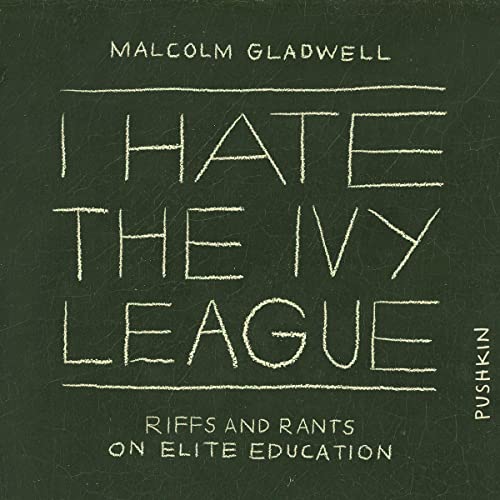You have /5 articles left.
Sign up for a free account or log in.
 I Hate the Ivy League: Riffs and Rants on Elite Education
I Hate the Ivy League: Riffs and Rants on Elite Education
Published in July 2022
Malcolm Gladwell has some hard things to say about elite higher education. We should listen.
If Gladwell or any of the brilliant people working at Pushkin are listening (I know they are smart, because we chatted after I reviewed Miracle and Wonder), here is what I’m proposing.
Pushkin Industries, the audio production company Gladwell co-founded and of which he is president, should do two things.
First, Gladwell and the Pushkin team should develop a discussion guide for the audiobook, a set of questions that students, professors and staff can discuss together. I’d be happy to help with that guide.
Second, Pushkin should figure out a way to provide the audiobook free of charge for anyone with an .edu email address. This task shouldn’t be too hard, as the audiobook mainly repackages Gladwell’s Revisionist History higher education–themed podcast episodes. There are no other book formats to worry about, and the only way to read the book is to download a digital file and listen.
In exchange for Gladwell’s company going through the effort and expense to get free versions of I Hate the Ivy League into the hands of students, faculty and staff—we (higher ed insiders) will do everything we can to organize campus conversations about the book.
Here, I’m calling Gladwell’s bet. If he thinks that the ideas explored in I Hate the Ivy League are worth discussing within higher education (and I agree they are!), he should take the necessary steps to enable that discussion.
Now, I want to be clear. In suggesting that we talk about the ideas explored in I Hate the Ivy League, I am not saying that I agree with those ideas. In listening to the book, I found some ideas compelling (around standardized testing, rankings and postsecondary financing) and some silly (Gladwell’s rant against investing in quality campus amenities, such as food).
To gesture a bit on where I think Gladwell gets higher education wrong, he seems to view the postsecondary system as a closed pie—a dollar spent here is one not available for something else. In reality, this is not how higher education works. A dollar spent on a priority such as quality housing or food may generate many more dollars in the form of increasing the demand for the institution. A terrific dining service may be the most efficient and effective strategy for generating dollars that can be invested in educating students from low- and middle-income families.
If I were going to debate Gladwell’s take on elite higher education—something I very much hope to do with students, faculty and staff—I’d try to make the point that correlation is not causation. It may be easy to identify easily visible data points, such as endowment size and student debt levels, and link the two.
But if you genuinely care about issues such as access, affordability, opportunity, completion, debt and quality in higher education, then focusing one’s energies on the deficiencies of elite universities is likely to be unproductive. (Although admittedly entertaining.)
I Hate the Ivy League contains too little analysis of the policy, demographic and structural forces that have resulted in the systemic underfunding of the public postsecondary system. Specifically, the book says way too little about community colleges and the failure at every level of government to adequately fund these most important of postsecondary institutions.
In Gladwell’s defense, leaders of elite educational institutions have also done much too little to advocate for public higher education.
Why would students, faculty and staff who study, teach and work at elite colleges and universities want to discuss a book with the subtitle Riffs and Rants on Elite Education?
First, we already spend considerable time critically looking at our institutions and the role our colleges and universities play in the broader postsecondary ecosystem. We study, teach and work in mission-driven institutions dedicated to creating opportunity and knowledge. We share Gladwell’s values around access, quality and costs—if we perhaps disagree on the means to achieve those goals.
Second, I think that I Hate the Ivy League may be a book that students, faculty and staff might actually succeed in reading and discussing. It is tough to get lots of people to read a book, much less get together and talk about it. This book is short—five hours and 11 minutes—and highly enjoyable.
You may disagree with much of what Gladwell has to say about higher education—I know I do—but you can’t argue that Gladwell is not a fantastic writer. He also has a wonderful speaking voice and a highly conversational delivery style. Shared campus books seldom work to generate the conversations envisioned. This book might be the exception.
Finally, an opportunity to discuss I Hate the Ivy League will provide an opportunity for some teachable moments. Sure, students, faculty and staff who listen to the book will learn something about higher education. They might learn the wrong things, but that will be up for debate and discussion. What they will learn is that our academic culture believes in the value of debating (even challenging and uncomfortable) ideas.
Readers will also learn the difference between what academics do, which involves a cautious statement of hypotheses to be tested with data, and what authors like Gladwell do. Ideally, participants in campus conversations of I Hate the Ivy League will come away with an appreciation of how we need both approaches, academic and journalistic, to make sense of our world.
So, Malcolm and team—what do you think? Are we going to find a way to make the great American I Hate the Ivy League campus conversation happen? You know where to reach me.
What are you reading?








